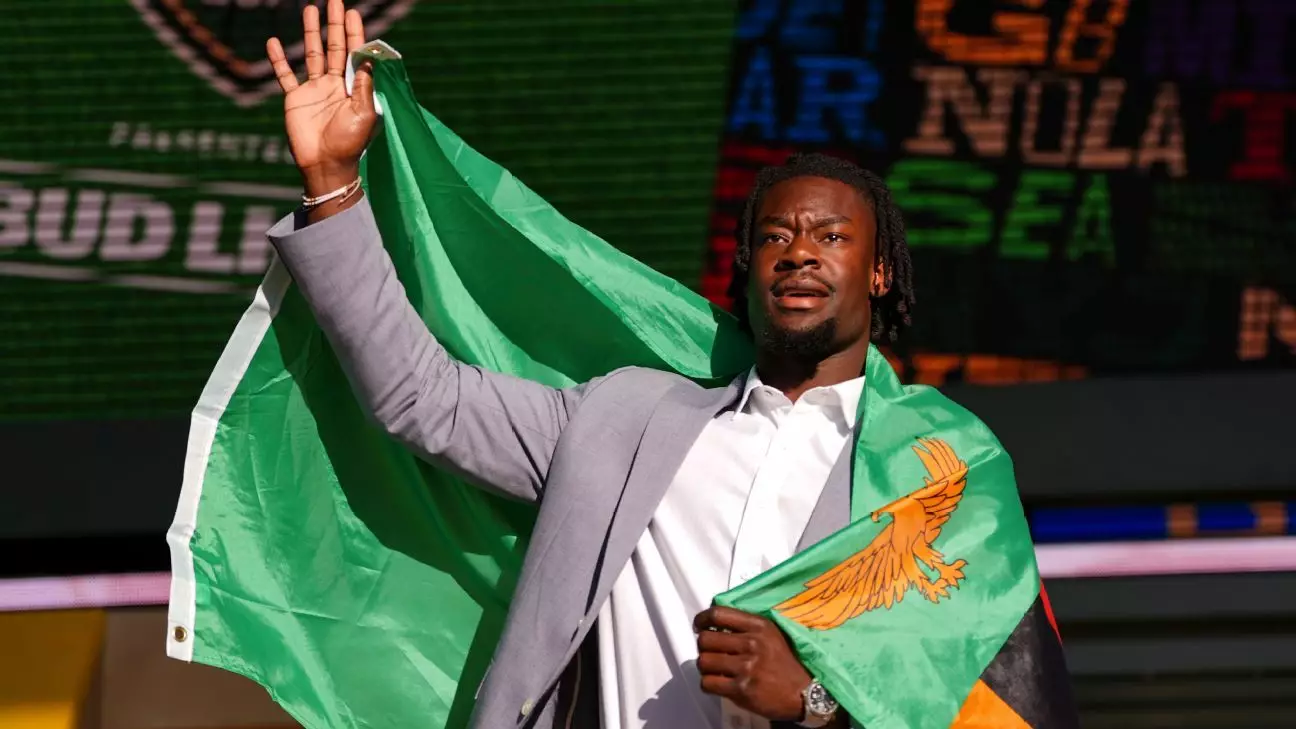Mapalo ‘Maz’ Mwansa’s narrative is not just a story of athletic ambition but a testament to the power of serendipity and the influence of those around us. Hailing from a family with Zambian roots yet raised in the English town of Peterborough, Mwansa’s childhood was steeped in the vibrant culture of soccer, inspired by the legendary Yaya Touré of Manchester City. However, the odds seemed stacked against him, as he had long resigned himself to a life devoid of competitive sports. Mwansa’s story shifted dramatically thanks to a casual observation made by his friend, Henry Rowland, a current player in the European League of Football (ELF). At what was meant to be a simple sports day—one in which Mwansa had merely aimed to showcase his abilities in sprinting—Rowland recognized a potential NFL star hidden in plain sight.
With no official sporting background and a defeatist mentality regarding professional athletics, Mwansa was proper “off the radar” until that pivotal moment. Rowland encouraged him to explore American football, igniting a flicker of hope that had long been extinguished. This encounter, which could easily have been brushed off, ultimately served as a portal through which Mwansa embarked on a transformative journey that led him to the NFL.
Finding a New Passion: Embracing the Game
Mwansa’s pivot to American football marked the beginning of what could become a remarkable athletic career. Initially allocated to the International Player Pathway (IPP) Program due to his late entrance into the sport, he was not discouraged by the unconventional path. Instead, this challenge fueled his determination. Transitioning from a defensive end to an EDGE rusher, Mwansa demonstrated the ability to adapt and grow quickly through calculated hard work and strategic learning.
His tactical education in the sport was crucial. While soccer had been driven by instinct and raw talent, American football required meticulous study and an understanding of intricate plays and defensive structures. Mwansa’s training required him to absorb not only the physical aspects but also the cerebral nature of the game. His motto, “See ball, get ball,” reflects a straightforward yet determined approach, while also recognizing the sophisticated strategies that American football entails.
As he studied the game, he looked to role models such as Nolan Smith Jr., the Philadelphia Eagles EDGE rusher, as he emulated their techniques and sought to embody their traits. This alignment with another player’s prowess serves as a reminder of the mentorship vital in sports, illustrating how collaboration and shared experiences can carve effective pathways to success.
Building Identity: Pride and Purpose
For Mwansa, the journey transcends personal achievement; it is deeply rooted in identity. His commitment to representing his Zambian heritage adds layers of meaning to his athletic pursuits. As a nation, Zambia has historically been underappreciated in the realm of sports, often met with surprise when its athletes shine on international stages. Reflecting on the public’s reaction to his compatriot Muzala Samukonga’s Olympic bronze medal, Mwansa’s observations highlight the stigma that African nations continue to combat—where success is often viewed through a skeptical lens rather than celebrated as the norm.
Mwansa is determined to shift this paradigm. He is driven by a desire for Zambian athletes to no longer elicit astonishment from global audiences when they achieve greatness. Inspired by a profound reverence for his heritage, Mwansa seeks to inspire future generations back home. He acknowledges the richness of talent in Zambia and envisions a reality where young athletes see their national predecessors thriving in competitive arenas without being met with disbelief.
Looking Ahead: The Path to the NFL and Beyond
As Mwansa steps into the world of professional football, he embodies a narrative of hope, resilience, and transformation. His trajectory from soccer dreamer to aspiring NFL star is an atypical but compelling story that symbolizes the multiplicity of possibilities in sports. The NFL, which has often been viewed as an insular fortress inhabited by American-born talents, is slowly morphing into a melting pot of international players. This evolution allows stories like Mwansa’s to flourish and reshapes the landscapes of sportsmanship.
His optimistic approach, paired with a now-activated determination, paves the way for a promising career. With every obstacle he overcomes, Mwansa is not just an athlete; he is becoming an ambassador for a nation hungry for recognition in the global sports arena. As he continues to train, learn, and grow into his role as an EDGE rusher, the weight of representation—both as a Zambian and as an athlete—lends additional significance to his journey. His evolution from a boy idolizing soccer legends to potentially carving out his legacy in the NFL is not merely an accomplishment; it is a clarion call for talent and determination—proving that dreams can materialize when nurtured by opportunity and belief.


Leave a Reply